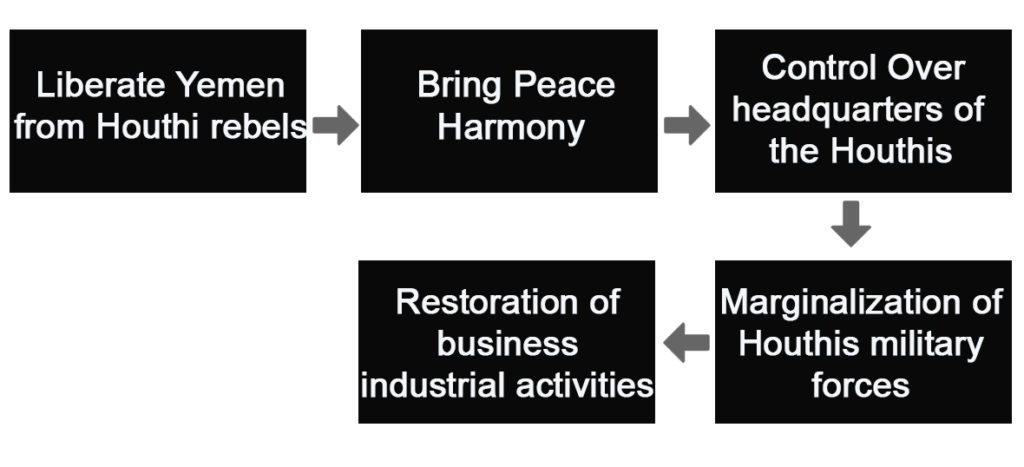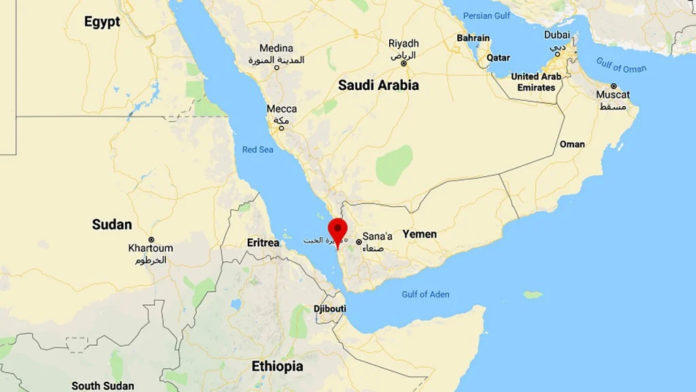UAE-Saudi Arabian military coalition is striving hard to liberate Yemen from Houthi rebels and its schemers and masters. Both countries launched massive military operation to bring peace and harmony to the country. Forces of instability and followers of proxy war have been active in different parts of Yemen for their own vested interests. The UAE-Saudi Arabia led military coalition and its local allies launched a long-anticipated offensive on the Yemeni port city of Hodeida opening a new front in the country’s intractable civil conflict and raising fears for millions of civilians.
The battle between a Saudi and Emirati-led coalition and Houthi rebels over the Red Sea port city of Hodeidah is the biggest battle of the three-year war in Yemen. Liberating Hodeidah would give the UAE-Saudi Arabian coalition the upper hand in the war that it is fighting to restore the internationally recognized government led by President Abed Rabbo Mansour Hadi.
With a population of 600,000 Hodeidah is the third most populated city in Yemen. It is considered a hub for business and industrial activities and its port is considered the second biggest in the country after Aden port. Strategically the control over Hodeidah port also means control over revenues from customs and tariffs on exported and imported goods.
Hodeidah has strategic importance too. The port city is the main command headquarters of the Houthis on the western coast and contains many important military and security installations, the main gateway where Houthis smuggle in weapons and is a major passage to the capital of Sanaa.
Hodeidah Sea Port Strategic Importance
Operation Golden Victory started after several calls put forward by the Yemeni government and the Saudi-led coalition asking the United Nations to take over the port, supervise its operations and force out the Houthi militias. Since the beginning of 2018, Yemen’s army and the Saudi led coalition have opened new fronts inside Saada, the Houthis’ main bastion that hosts their major arsenal of ballistic missiles and key leaders. The attack on Saada has prevented the Houthis from sending reinforcements to other fronts, including the Red Sea, which helped government forces to advance there.
UAE-Saudi Arabia cooperation with Yemeni factions contributed to the success of the government forces. Operation Golden Victory, aimed at liberating Hodeidah, the last major coastal area under control of the Houthi militias, was launched on May 11 but was halted for a grace period for UN-led peace efforts. Yemen’s government declared on June 12, that negotiations had failed to force the rebels from Hodeidah and the UAE-Saudi coalition began its assault on the port.

The Houthis are increasing their ballistic missile attacks on Saudi Arabia to shore up the morale of their militiamen and to give the perception they have the upper hand on the battlefield. It is hoped that Yemeni armed forces backed by the Arab coalition will regain control over the city, then all coastal fronts vital for Houthi arms and logistic supplies will consequently fall, especially given that the Yemeni legitimate government has control over the strategic ports of the coastal city of Midi and al-Mokha.
By losing the strategic port of Hodeidah, the Houthis will be confined to closed, landlocked areas. This could force the Houthis into a fight for survival, which may drive them return to negotiations.
It is proven that Iran has provided the Houthi militias with weapons through the port of Hodeidah, through a line extending from the Iranian port of Bandar Abbas through Somali ports and small islands, used to stop and transfer arms by small boats to the coasts of Hodeidah.
The war in Yemen is still far from being over, but the battle for Hodeidah is a turning point, a potential trigger for negotiations to end the war that has already claimed more than 10,000 lives. UAE Minister of State for Foreign Affairs Dr. Anwar Gargash has warned Houthi rebels to withdraw unconditionally from the port of Hodeidah or face losing all political leverage. Operation Golden Victory has been carried out to help the UN to convince the Houthis to withdraw and avoid any confrontation.
Iran has been supplying martial and human support to Houthi rebels in Yemen. The Yemeni army shot down an Iranian-made drone that belongs to the Houthi rebels over Hodeidah province. Brig Gen Abdelrahman Al Lahji, a commander in the army’s former elite Al Amalikah brigades, rebuilt with the help of the UAE, said the drone was carrying explosive devices over the Al Nukhaila area north of Al Duraihimi district.
Operation Golden Victory was launched to dislodge an Iranian-allied rebel group of Houthis that controls Hodeida on Yemen’s Red Sea coast. The port is the main entry point for food and humanitarian aid supplies that millions rely on in Houthi controlled areas but it has been misused to receive military assistance from Iran and its allied.
Both the countries and its regional allies are of the opinion that defeating the Houthis in the city would force them to the negotiating table more than three years after they took over much of Yemen’s north, setting off a civil war and a devastating humanitarian crisis in the Arab world’s poorest country.

The liberation of the port of Hodeida is a turning point in their struggle to take back Yemen from the militias that hijacked it which represents the beginning of the fall of the Houthis. Aid agencies have already warned that the Hodeida offensive would almost certainly deepen civilian suffering, threatening nearly half a million people who live in the city while cutting off critical aid at a time when a third of Yemen’s citizens are on the brink of famine but Houthis rebels are not heeding genuine concerns of the global community and peace-loving countries.
Coalition warplanes are carrying out strikes on Houthi fortifications to support ground operations by Yemeni troops massed south of the Red Sea port. The liberation of the port is the start of the fall of the Houthi militia and will secure marine shipping in Bab al-Mandab strait and cut off the hands of Iran, which has long drowned Yemen in weapons that shed precious Yemeni blood.
More than 2000 troops had crossed the Red Sea from a UAE naval base in Eritrea, with plans to seize the port at Hodeida. A separate Yemeni-UAE force advanced from the south, near the city’s airport. There were signs the rebels were intending to defend the city. Houthis were mobilizing tanks and armored vehicles about 6 miles from the airport, which sits on the city’s southern edge.
The Trump administration, which provides military support to the coalition, had asked the Emirates to hold off on an operation until after U.N. envoy Martin Griffiths presented a new plan for jump-starting peace talks.
The Saudi-led coalition’s plan is to take control only of the airport and seaport, plus the route leading to Sanaa, and will not fight a street war with the Houthis in Hodeidah city for the safety of civilians.
Concluding Remarks
UAE-Saudi Arabian military coalition and its Yemeni supporters have been seriously engaged in liberating the country from Houthi rebels. Both countries are sincerely working to bring sustainable peace in the country. The ongoing military operation in Yemen is the ideal combination of military tactics and humanitarian assistance. On the contrary, Houthis rebels have been misusing even human capital in the race of so called political survival. It has been schemed and supported by Iran and its allies in the region which has actually spoiled the basic social fabric of Yemen society. There are serious allegations of women being raped by Houthis rebels. Child soldiers have also been hallmark of Houthis rebels strategy in the ongoing was in Yemen.
Operation Golden Victory was started to liberate the city from the siege of Houthis rebels. It had some serious military concerns too. Fall of Hodeidah Sea Port will marginalize the Houthis rebels maneuvering in the country and business and industrial activities will also be restored with the fall of Hodeidah Sea Port. The UAE-Saudi Arabian military coalition is engaged against Houthis rebels for the last three years, now the Hodeidah Sea Port battle is the turning point.




